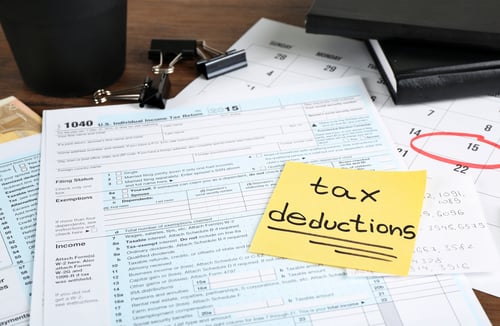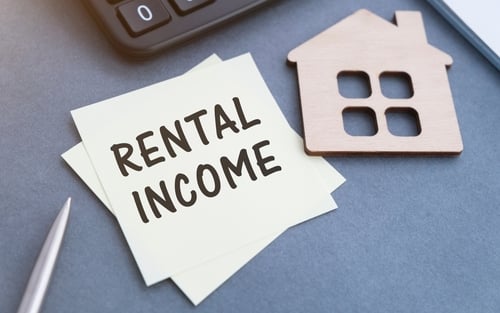
As we approach the end of the year, rental investors must prepare for tax season. For many, taxes are stressful and can be hard to navigate without professional help. While there are a ton of tax write-offs for real estate investors, property owners must file taxes correctly to make it as beneficial as possible.
That said, if you are a rental investor and you need help determining what constitutes a tax write-off, you’ve come to the right place. Keep reading as we go over the most popular tax write-offs for real estate investors.
How to Claim Tax Deductions for Rental Properties
There are many benefits to owning rental property. However, it is crucial to claim tax deductions on your rentals accurately. The first step is to know what can be written off and how deductions work.
To claim any deductions on your rental property, you must fill out a Schedule E form when filing taxes. Along with that, you must show proof of each transaction claimed. That said, it can get complicated while filing your own taxes, so it may help to get professional tax advice. After all, the goal is to get a maximum refund while avoiding an audit or any other issues.
For tax help, you can connect with a Tax Specialist or Financial Advisor who can help you go over all the forms and help you stay organized. Otherwise, you can get tax and management help from a property management company. Hiring a property management company will ensure that you have help with finances, taxes, and record-keeping, along with leasing and maintenance services.
What is Considered Rental Income for Investors?

When it comes to the technicalities of what counts as rental income, it’s essential for investors to know and fully understand what to document. Otherwise, landlords who misreport their income may come across an audit while filing taxes. So keep reading as we go over what is considered rental income.
- Monthly Rental Payments- Tenants’ monthly rent payments are considered income for landlords.
- Expenses Paid by the Tenant- Services paid by the tenant as part of their rent are also considered income for landlords.
- Services for Money Trades- Even when tenants “work off” some of their rental payments, it’s still considered income at fair market value for landlords.
- Security Deposit Funds- Any portion of the security deposit held by the landlord counts as rental income for tax purposes.
Now that we’ve gone over four ways landlords make rental income, let’s go over what investors can write off when they file taxes.
Top 10 Tax Write-Offs for Real Estate Investors
Creating a successful rental business means knowing how to maximize all the available tax write-offs for real estate investors. Luckily, there are a lot of tax benefits for rental property investments compared to other investment categories.
That said, to help you get a head start on your tax planning, let’s look at the top 10 tax write-offs for real estate investors.
- Interest
- Depreciation
- Insurance
- Legal Services
- Home Repairs
- Employees or Contractors
- Personal Property
- Pass-Through Tax Deduction
- Travel Expenses
- Home Office Usage
Interest
One of the most significant tax write-offs for investors is interest. Deductions in this category may include interest on mortgage loan payments used to purchase or repair the rental home. Otherwise, landlords can claim interest from credit cards that property owners use to buy goods or services for the rental house.
Depreciation
Another extremely popular tax write-off for investors includes depreciation. Depreciation allows property owners to get back a portion of real estate costs over several years.
That said, property owners cannot fully deduct the cost of a single-family home, multi-family building, or other rental space in the year it is purchased. If you are a rental investor and want to use depreciation to your advantage, check out our tips here.

Insurance
Rental insurance policy premiums are all tax-deductible. Some of the most common tax-deductible insurance policies include landlord liability, fire, theft, or flood insurance. Along with that, if you have employees, landlords can deduct expenses related to health or workers’ compensation insurance.
Professional or Legal Services
Rental property owners can write off fees paid to legal professionals like accountants, financial advisors, or tax specialists. However, all deducted costs must be directly related to your rental business. Additionally, rental homeowners can deduct property management fees since it is a professional service.
Home Repairs
Home repairs are another excellent tax write-off for rental homeowners. That said, for it to count as a deduction, the repair must be necessary, reasonable, and ordinary. Along with that, landlords can only deduct repairs within the year that they occurred. For example, some repairs may include fixing a leak, repainting the walls, or patching the roof.
Employees or Contractors
When landlords hire an outside contractor or employee to perform tasks related to the rental business, it entitles them to deduct their wages. However, for tax purposes, it counts as a business expense. That said, landlords can write off employee wages, whether a maintenance man or a property manager.
Personal Property
Sometimes, landlords use personal property within their rental homes. Some examples of personal property may include appliances, furniture, or yard maintenance equipment. All of these items may be deductible within the given tax year. However, this applies to property items costing up to $2,000.
Pass-Through Tax Deduction
Established by the Tax Cuts and Jobs Act in 2018, this tax write-off allows landlords to deduct either of the following depending on their income:
- Up to 20% of Net Rental Income
- 5% of Initial Property Cost + 25% of Amount Owners Pay Employees
Unless extended by Congress, this write-off will expire on January 1, 2026.
Travel Expenses
Owning one or more rental properties can involve quite a bit of traveling. Whether you have a showing with a tenant or a necessary repair, landlords can travel a lot. Luckily, investors can deduct most driving and travel expenses related to their rental business.
Depending on your travel methods, the tax benefits can add up quickly. For example, if you have a vehicle, van, or truck used for maintenance, you can deduct quite a bit. Expenses like gasoline, vehicle maintenance, and repairs can be deductible. Along with that, standard mileage used for travel may also be deductible.
Home Office Usage
Many individuals these days are starting to work from home. Many landlords don’t know that they can claim allowances for home offices expenses, but they can! This is not as common as other tax write-offs for landlords but can still be highly beneficial.
If you meet the requirements, landlords can deduct expenses related to office work, workshop space, or other space in the home used for the rental business.
Need Help Maintaining Property Finances?

As tax season approaches, the end of the year can be an extremely stressful time for rental investors. Most landlords don’t want to deal with audits or issues when they file taxes. That said, to avoid any complications, investors should work alongside a qualified accountant or tax professional. Additionally, hiring a property management company can also benefit investors.
A professional property management company, such as Bay Property Management Group, can benefit your rental business in many ways. At BMG, we understand how stressful it is to be a landlord. That’s why we take care of everything from tenant screening and paperwork to eviction filings and court proceedings. If you need help with your Northern Virginia rental management, reach out to our dedicated group of professionals at Bay Property Management Group today.

